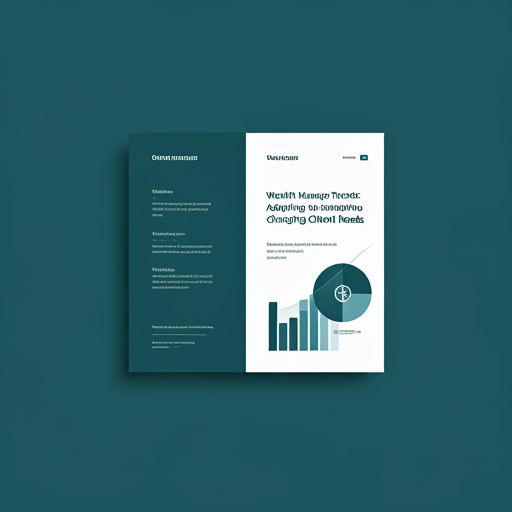Introduction to Wealth Management in the Cryptocurrency Era
The Evolution of Wealth Management
Wealth management has undergone significant transformation in recent years , particularly with the advent of cryptocurrency. This digital asset class has introduced new paradigms for investment strategies and client engagement. As investors seek diversification, they increasingly consider cryptocurrencies as viable components of their portfolios. This shift reflects a broader trend towards embracing innovative financial instruments.
Moreover, the rise of blockchain technology has enhanced transparency and security in transactions. Many investors appreciate these attributes, as they align with their desire for trust in financial dealings. The integration of cryptocurrencies into wealth management practices necessitates a nuanced understanding of market dynamics. It is essential for professionals to stay informed about regulatory developments. Knowledge is power in this evolving landscape.
Impact of Cryptocurrency on Traditional Wealth Management
The emergence of cryptocurrency has significantly influenced traditional wealth management practices. Financial advisors now face the challenge of integrating digital assets into established portfolios. This integration requires a comprehensive understanding of both asset classes. Many clients are eager to explore these new opportunities.
Furthermore, the volatility of cryptocurrencies demands a revised risk assessment approach. Investors must be educated about potential fluctuations. This knowledge empowers them to make informed decisions. As a result, wealth managers are adapting their strategies to accommodate fhese changes. Staying ahead of trends is crucial for success.
Understanding Client Needs in a Digital Age
Shifts in Client Demographics
Recent trends indicate significant shifts in client demographics within wealth management. Younger investors, particularly millennials and Gen Z, are increasingly prioritizing digital assets. This generation values innovation and seeks investment opportunities that align with their tech-savvy lifestyles. They often prefer platforms that offer seamless digital experiences.
Moreover, these clients tend to favor sustainable and socially responsible investments. Their preferences reflect a broader societal shift towards ethical considerations
Changing Investment Preferences and Risk Tolerance
Investment preferences are evolving as clients become more informed and engaged. Many investors are now gravitating towards alternative assets, including cryptocurrencies and ESG-focused investments. This shift reflects a desire for diversification and alignment with personal values. Clients are increasingly aware of the potential for higher returns.
Additionally, risk tolerance is also changing among different demographics. Younger investors often exhibit a higher risk appetite, driven by a long-term investment horizon. They are willing to embrace volatility for potential gains. Understanding these dynamics is crucial for wealth managers. Adapting strategies to meet these preferences is essential.
Integrating Cryptocurrency into Wealth Management Strategies
Asset Allocation and Diversification
Effective asset allocation and diversification are critical in modern wealth management. Integrating cryptocurrency into traditional portfolios can enhance overall returns. A balanced approach may include:
This strategy allows for exposure to high-growth potential while managing risk. Cryptocurrencies can act as a hedge against inflation. Many investors find this appealing. Additionally, diversification across various asset classes reduces volatility. It is essential to regularly reassess allocations based on market conditions. Staying informed is key to successful investment management.
Tax Implications and Regulatory Considerations
Integrating cryptocurrency into wealth management strategies involves navigating complex tax implications and regulatory considerations. Investors must be aware that cryptocurrencies are treated as property for tax purposes. This classification leads to capital gains taxes on profits from sales.
Key considerations include:
He should maintain accurate records of all transactions. This practice ensures compliance and facilitates tax reporting. Additionally, regulatory frameworks are evolving, which may impact investment strategies. Staying updated on these changes is crucial. Knowledge is essential for effective wealth management.
Technological Innovations Shaping Wealth Management
Blockchain Technology and Its Applications
Blockchain technology is revolutionizing wealth management through enhanced transparency and security. By providing a decentralized ledger, it allows for real-time tracking of transactions. This capability reduces the risk of fraud and increases trust among investors. Many professionals find this feature invaluable.
Additionally, smart contracts automate processes, minimizing the need for intermediaries. This efficiency can lead to cost savings and faster transaction times. He should consider these advantages when evaluating investment strategies. Furthermore, blockchain facilitates the tokenization of assets, enabling fractional ownership. This innovation opens new avenues for diversification. Understanding these applications is essential for modern wealth management.
Robo-Advisors and AI in Cryptocurrency Investment
Robo-advisors and artificial intelligence are transforming cryptocurrency investment strategies. These technologies analyze vast amounts of data to identify trends and optimize portfolios. This capability allows for more informed decision-making. Many investors appreciate the efficiency of automated systems.
Robo-advisors can tailor investment strategies based on individual risk profiles. They provide personalized recommendations without the need for human intervention. This approach can lower costs and increase accessibility for a broader audience. Additionally, AI algorithms continuously learn from market fluctuations. This adaptability enhances performance over time. Understanding these innovations is crucial for effective wealth management.
Future Trends in Wealth Management
Emerging Investment Opportunities
Emerging investment opportunities are reshaping the landscape of wealth management. As technology advances, sectors such as renewable energy and biotechnology are gaining traction. These industries offer significant growth potential, attracting forward-thinking investors. Many professionals recognize the importance of diversification in these areas.
Additionally, the rise of decentralized finance (DeFi) presents unique investment avenues. DeFi platforms enable users to lend, borrow, and earn interest on cryptocurrencies. This innovation challenges traditional banking models. Investors should also consider the implications of non-fungible tokens (NFTs). These digital assets are creating new markets and revenue streams. Staying informed about these trends is essential for strategic investment planning.
Preparing for Market Volatility and Economic Changes
Preparing for market volatility and economic changes is essential for effective wealth management. Investors must adopt a proactive approach to mitigate risks associated with fluctuating markets. Diversification across asset classes can help cushion against downturns. This strategy reduces exposure to any single investment.
Moreover, maintaining a cash reserve provides liquidity during uncertain times. He should consider reallocating assets based on market conditions. Regular portfolio reviews are crucial for adapting to economic shifts. Understanding macroeconomic indicators can guide investment decisions. Knowledge is power in navigating volatility. Staying informed enhances strategic planning.
